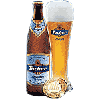Brauerei Tucher Bräu - Tucher Helles Hefe Weizen
-
ABV:
5.20% -
Serving Temperature:
42-47° F -
Suggested Glassware:
Weizen Glass
This beer is an old Bavarian beer specialty. Helles Hefe Weizen, literally translated, means "light wheat with yeast." You may be familiar with the term "dunkel," (pronounced dune-kuhl) which means "dark"—the counterpoint to light, helles beers. This beer is the perfect warm-weather beer due to its crisp, clean and refreshing, thirst quenching nature. To fully enjoy the flavors of this beer, we encourage you to pour about 2/3rds of the bottle into the appropriate weizen glass, then vigorously swirl the remainder in the bottle to rouse and collect the sedimentary layer at the bottom of the bottle, then finish your pour. Seriously, Tucher Bräu holds a patent on the process of keeping cloudy, yeasty beers stable—all so you can enjoy this bottled beer as if it was drawn from a just-tapped keg—so don't undermine their efforts or deprive yourself of your daily dose of B-vitamins, you'll be getting a good dose of them from that yeast. Look for notes of melon, wheat (surprise!) and banana on the nose, with just a touch of clove spiciness and a hint of peach skins. Expect a firm wheat twang upfront with muted apple & nearly-ripe banana notes, and a late-breaking, very subtle bitter melon-character (like biting too deeply into a watermelon wedge and getting a nibble of the inside rind), moving to a remarkably thirst-quenching, slightly spicy, mildly bitter, dry finish. For the perfect weekend breakfast treat, pair with weissewurst. Good morning, world! You could do this on the weekdays, too, assuming you take public transportation to work and don't have any morning face-to-face meetings… Also works well with wiener schnitzel or mild Indian dishes.
Germany's Franconia region has a well known winemaking history, but the region around Nuremberg, home to our first featured international brewery, has dry soil not suitable to the growing of grapes. Consequently, the German vintner's industry never really gained solid footing there. Wheat-growing fields, on the other hand, have traditionally been abundant, as has a local thirst for sustaining, liquid refreshment. Thus was born a great tradition of regional wheat beer brewing. In fact, the region is home to one of Germany's oldest and most prolific brewing heritages.
Brauerei Tucher Bräu (Tucher is pronounced "took'er") was founded in Nuremberg over 335 years ago. It began as an integral member of the wheat-beer brewing force in 1672 and for part of its history was owned by Bavaria's royal family. An ancient patrician family who settled in Nuremberg in the 11th century, the Tucher family (or "Freiherrlich von Tucher'schen Familie" for you German purists out there) took over in 1855. Though the brewery has had several owners in the 153 years since (never shedding the Tuchers' good name), it became a family business again in 1994 when a member of the Bavarian brewing dynasty Inselkammer took over (this is the family responsible for the celebrated Ayinger beer brand).
You're probably already familiar with the fundamental Bavarian beer purity law known as the Reinheitsgebot of 1516, which mandates that all beer be made with only water, malt, hops and yeast. It's an edict that has guided not only German brewers, but many of the craft brewers in the American microbrew revolution. Fascinatingly, Nuremberg had its own pure-beer law established in 1303, more than 200 years before Bavaria's more well-known Reinheitsgebot! With brewing history like that, it's quite the understatement to comment that Nuremberg's brewers are well-versed in the virtues of beery bliss. Speaking of beery bliss—what are you waiting for? Summer weather is calling—so crack open that Tucher Helles Hefe Weizen and enjoy. Prost!

Unmatched Variety by style, brewery & country
Choose from Five different Beer Clubs offering unmatched variety by brewery,
country of origin, and beer style to suit your specific tastes.


